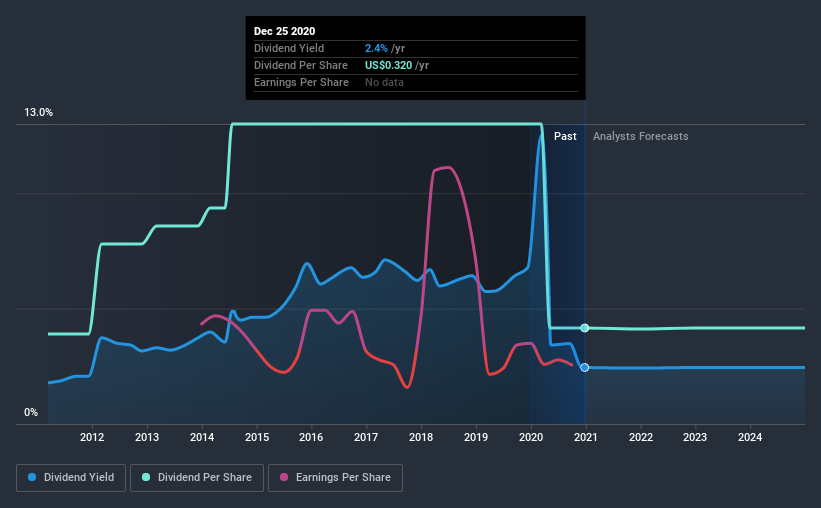Dividend Investors: Don't Be Too Quick To Buy Covanta Holding Corporation (NYSE:CVA) For Its Upcoming Dividend

Some investors rely on dividends for growing their wealth, and if you're one of those dividend sleuths, you might be intrigued to know that Covanta Holding Corporation (NYSE:CVA) is about to go ex-dividend in just three days. Investors can purchase shares before the 30th of December in order to be eligible for this dividend, which will be paid on the 8th of January.
Covanta Holding's next dividend payment will be US$0.08 per share, on the back of last year when the company paid a total of US$0.32 to shareholders. Based on the last year's worth of payments, Covanta Holding has a trailing yield of 2.4% on the current stock price of $13.07. Dividends are a major contributor to investment returns for long term holders, but only if the dividend continues to be paid. As a result, readers should always check whether Covanta Holding has been able to grow its dividends, or if the dividend might be cut.
See our latest analysis for Covanta Holding
Dividends are typically paid from company earnings. If a company pays more in dividends than it earned in profit, then the dividend could be unsustainable. Covanta Holding reported a loss after tax last year, which means it's paying a dividend despite being unprofitable. While this might be a one-off event, this is unlikely to be sustainable in the long term. Considering the lack of profitability, we also need to check if the company generated enough cash flow to cover the dividend payment. If Covanta Holding didn't generate enough cash to pay the dividend, then it must have either paid from cash in the bank or by borrowing money, neither of which is sustainable in the long term. It paid out more than half (74%) of its free cash flow in the past year, which is within an average range for most companies.
Click here to see the company's payout ratio, plus analyst estimates of its future dividends.

Have Earnings And Dividends Been Growing?
Businesses with shrinking earnings are tricky from a dividend perspective. If business enters a downturn and the dividend is cut, the company could see its value fall precipitously. Covanta Holding was unprofitable last year and, unfortunately, the general trend suggests its earnings have been in decline over the last five years, making us wonder if the dividend is sustainable at all.
Many investors will assess a company's dividend performance by evaluating how much the dividend payments have changed over time. Covanta Holding has delivered 0.6% dividend growth per year on average over the past 10 years.
Get our latest analysis on Covanta Holding's balance sheet health here.
To Sum It Up
Should investors buy Covanta Holding for the upcoming dividend? We're a bit uncomfortable with it paying a dividend while being loss-making. However, we note that the dividend was covered by cash flow. Bottom line: Covanta Holding has some unfortunate characteristics that we think could lead to sub-optimal outcomes for dividend investors.
With that in mind though, if the poor dividend characteristics of Covanta Holding don't faze you, it's worth being mindful of the risks involved with this business. We've identified 3 warning signs with Covanta Holding (at least 2 which are a bit unpleasant), and understanding these should be part of your investment process.
If you're in the market for dividend stocks, we recommend checking our list of top dividend stocks with a greater than 2% yield and an upcoming dividend.
If you decide to trade Covanta Holding, use the lowest-cost* platform that is rated #1 Overall by Barron’s, Interactive Brokers. Trade stocks, options, futures, forex, bonds and funds on 135 markets, all from a single integrated account. Promoted
New: Manage All Your Stock Portfolios in One Place
We've created the ultimate portfolio companion for stock investors, and it's free.
• Connect an unlimited number of Portfolios and see your total in one currency
• Be alerted to new Warning Signs or Risks via email or mobile
• Track the Fair Value of your stocks
This article by Simply Wall St is general in nature. It does not constitute a recommendation to buy or sell any stock, and does not take account of your objectives, or your financial situation. We aim to bring you long-term focused analysis driven by fundamental data. Note that our analysis may not factor in the latest price-sensitive company announcements or qualitative material. Simply Wall St has no position in any stocks mentioned.
*Interactive Brokers Rated Lowest Cost Broker by StockBrokers.com Annual Online Review 2020
Have feedback on this article? Concerned about the content? Get in touch with us directly. Alternatively, email editorial-team (at) simplywallst.com.


